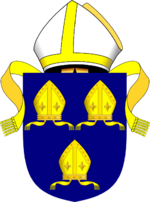Diocese of Norwich facts for kids
Quick facts for kids Diocese of NorwichDioecesis Norvicensis |
|
|---|---|

Coat of arms
|
|

Flag
|
|
| Location | |
| Ecclesiastical province | Canterbury |
| Archdeaconries | Lynn, Norfolk, Norwich |
| Statistics | |
| Parishes | 563 |
| Churches | 656 |
| Information | |
| Cathedral | Norwich Cathedral |
| Language | English |
| Current leadership | |
| Bishop | Graham Usher, Bishop of Norwich |
| Suffragans | Jane Steen, Bishop of Lynn Ian Bishop, Bishop of Thetford |
| Archdeacons | Steven Betts, Archdeacon of Norfolk Keith James, Archdeacon of Norwich Catherine Dobson, Archdeacon of Lynn |
| Website | |
| www.dioceseofnorwich.org | |
The Diocese of Norwich is a special area of the Church of England in England. It is part of the Province of Canterbury. Think of it like a region that a bishop looks after.
Contents
History of the Diocese
The Diocese of Norwich has a very long history! It started way back in 630. Back then, it was known as the Diocese of the Bishop of the East Angles.
Over time, the main church (called a cathedral) moved a few times.
- In 673, it moved to a place called Elmham.
- After the Norman invasion, around 1070, it moved again to Thetford.
- Finally, in 1094, it settled in Norwich, where it is today.
The diocese covers most of Norfolk county. It also includes a small part of Suffolk county, around the port of Lowestoft. This whole area is quite large, covering over 1,800 square miles (about 4,660 square kilometers). In 2008, about 867,000 people lived in this area.
Long ago, the Diocese of Norwich was even bigger. But over the years, some parts were separated to form new dioceses. For example, the Diocese of St Edmundsbury and Ipswich was created in 1914.
How the Diocese is Organised
Bishops and Their Helpers
The main leader of the Diocese of Norwich is the Bishop of Norwich. Currently, this is Graham Usher.
The Bishop of Norwich has two special helpers called suffragan bishops:
- The Bishop of Thetford (Ian Bishop)
- The Bishop of Lynn (Jane Steen)
These suffragan bishop roles have been around for a long time. The Bishop of Thetford role was first created in 1534, then brought back in 1894. The Bishop of Lynn role was created in 1963.
There are also other bishops who help out in the diocese. These are often retired bishops who live in the area. They are called honorary assistant bishops.
Archdeaconries and Deaneries
The Diocese of Norwich is divided into smaller areas to help manage everything. These areas are called archdeaconries, and they are led by archdeacons. The three archdeaconries in Norwich are:
- Norwich
- Norfolk
- Lynn
Each archdeaconry is then split into even smaller areas called deaneries. These smaller groups help local churches work together. For example, the Deanery of Norwich East includes churches in that part of the city.
Churches in the Diocese
The Diocese of Norwich has many churches, with 656 churches in 563 parishes! A parish is a local church area. The main church of the diocese is Norwich Cathedral, which is a very old and important building.
Many churches in the diocese have special names, often named after saints. Here are some of the most common names:
- St Mary (or St Mary the Virgin): This is the most popular name for churches, with over 120 churches named after Mary, the mother of Jesus.
- All Saints: Many churches are named "All Saints," meaning they are dedicated to all the saints.
- St Andrew: Named after Andrew the Apostle, a follower of Jesus.
- St Peter: Named after Saint Peter, another important follower of Jesus.
- St Margaret: Named after Saint Margaret the Virgin.
- St Michael: Named after Michael the Archangel.
- St Edmund: Named after Edmund the Martyr, a king of East Anglia.
- St John the Baptist: Named after John the Baptist, who baptised Jesus.
- Holy Trinity: Named after the Holy Trinity (God as Father, Son, and Holy Spirit).
These names show the long history and traditions of the churches in the Diocese of Norwich.
 | James Van Der Zee |
 | Alma Thomas |
 | Ellis Wilson |
 | Margaret Taylor-Burroughs |

